|
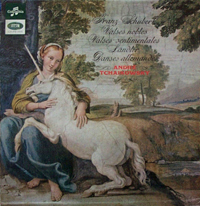
Cover for
EMI Columbia
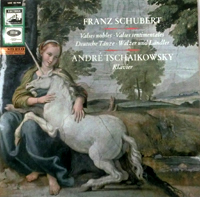
Cover for
EMI Electrola
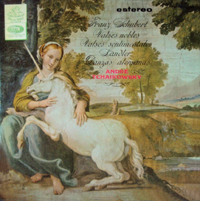
Cover for
Discos Angel
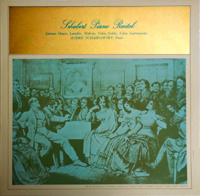
Cover for World Record Club
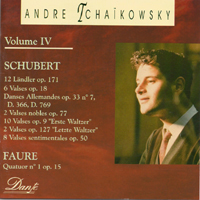
Cover for Danté Reissue
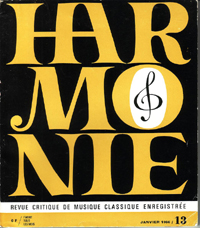
Harmonie
Magazine Review
January 1966
Click Here - in
French
Click
Here - in English

Click
Here - Bnf Reference
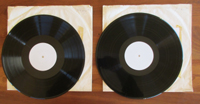
Test pressing
YLX1204/YLX1205
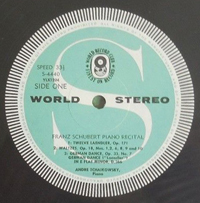
World Record Club Disc
|
Columbia
Records (EMI Pathé Marconi) SAXF-1057 (Stereo) (French)
Columbia Records (EMI Pathé Marconi) FCX-1057 (Mono) (French)
Columbia Records (EMI Electrola) SME-80988 (Stereo) (German)
Discos Angel SLPC-12256 (Spanish)
World Record Club WRC-S-1440 (Australia)
Reissue - Danté Records, HPC049 - Vol. 4
Schubert Recital
Music/MP3
Schubert -12 Ländler, Opus 171
1. Opus
171, No. 1 / 01_schubert_opus_171_no_1.mp3
2. Opus 171, No. 2 / 02_schubert_opus_171_no_2.mp3
3. Opus 171, No. 3 / 03_schubert_opus_171_no_3.mp3
4. Opus 171, No. 4 / 04_schubert_opus_171_no_4.mp3
5. Opus 171, No. 5 / 05_schubert_opus_171_no_5.mp3
6. Opus 171, No. 6 / 06_schubert_opus_171_no_6.mp3
7. Opus 171, No. 7 / 07_schubert_opus_171_no_7.mp3
8. Opus 171, No. 8 / 08_schubert_opus_171_no_8.mp3
9. Opus 171, No. 9 / 09_schubert_opus_171_no_9.mp3
10. Opus 171, No. 10 / 10_schubert_opus_171_no_10.mp3
11. Opus 171, No. 11 / 11_schubert_opus_171_no_11.mp3
12. Opus 171, No. 12 / 12_schubert_opus_171_no_12.mp3
Schubert - Valses, Opus 18, No. 1, 2, 6, 8, 9, 10
1. Opus
18, No. 1 / 13_schubert_opus_18_no_1.mp3
2. Opus 18, No. 2 / 14_schubert_opus_18_no_2.mp3
3. Opus 18, No. 6 / 15_schubert_opus_18_no_6.mp3
4. Opus 18, No. 8 / 16_schubert_opus_18_no_8.mp3
5. Opus 18, No. 9 / 17_schubert_opus_18_no_9.mp3
6. Opus 18, No. 10 / 18_schubert_opus_18_no_10.mp3
Schubert - Dances allemandes, Opus 33, No. 7
Danse Op.
33, No. 7, D783 / 19_schubert_opus_33_no_7.mp3
Schubert - "Ländler" en mib mineur, D. 366
Danse D366
/ 20_schubert_danse_d_366.mp3
Schubert - Deux danses allemandes, D. 769
1. Danse
No. 1, D769 / 21_schubert_danse_no_1_d_769.mp3
2. Danse No. 2, D769 / 22_schubert_danse_no_2_d_769.mp3
Schubert - Valses nobles, Opus 77, No. 9, 10
1. Opus
77, No. 9 / 23_schubert_valses_nobles_opus_77_no_9.mp3
2. Opus 77, No. 10 / 24_schubert_valses_nobles_opus_77_no_10.mp3
Schubert - Valses, Op 9, No 19, 21, 22, 26, 29, 30, 32, 34, 35, 36
1. Opus
9, No. 19 / 25_schubert_valses_opus_9_no_19.mp3
2. Opus 9, No. 21 / 26_schubert_valses_opus_9_no_21.mp3
3. Opus 9, No. 22 / 27_schubert_valses_opus_9_no_22.mp3
4. Opus 9, No. 26 / 28_schubert_valses_opus_9_no_26.mp3
5. Opus 9, No. 29 / 29_schubert_valses_opus_9_no_29.mp3
6. Opus 9, No. 30 / 30_schubert_valses_opus_9_no_30.mp3
7. Opus 9, No. 32 / 31_schubert_valses_opus_9_no_32.mp3
8. Opus 9, No. 34 / 32_schubert_valses_opus_9_no_34.mp3
9. Opus 9, No. 35 / 33_schubert_valses_opus_9_no_35.mp3
10. Opus 9, No. 36 / 34_schubert_valses_opus_9_no_36.mp3
Schubert - "Letzte Walzer" Opus 127, No. 15, 18
1. Opus
127 / No. 15 / 35_schubert_valses_opus_127_no_15.mp3
2. Opus 127 / No. 18 / 36_schubert_valses_opus_127_no_18.mp3
Schubert - Valses sentimentales, Opus 50, No. 1, 3, 7, 12, 13, 15, 19,
27
1. Opus
50 / No. 1 / 37_schubert_valses_opus_50_no_1.mp3
2. Opus 50 / No. 19 / 38_schubert_valses_opus_50_no_19.mp3
3. Opus 50 / No. 27 / 39_schubert_valses_opus_50_no_27.mp3
4. Opus 50 / No. 3 / 40_schubert_valses_opus_50_no_3.mp3
5. Opus 50 / No. 7 / 41_schubert_valses_opus_50_no_7.mp3
6. Opus 50 / No. 15 / 42_schubert_valses_opus_50_no_15.mp3
7. Opus 50 / No. 12 / 43_schubert_valses_opus_50_no_12.mp3
8. Opus 50 / No. 13 / 44_schubert_valses_opus_50_no_13.mp3
Fauré [Danté reissue only] Quatuor No. 1, Op. 15
André
Tchaikowsky, piano
Michael Belmgrain, violin
Lars Grund, Viola
Ino Jansen, Cello
1. Allegro
molto moderato / 45_faure_quatuor_no_1_op_15
_1.mp3
2. Scherzo - Allegro vivo / 46_faure_quatuor_no_1_op_15
_2.mp3
3. Adagio / 47_faure_quatuor_no_1_op_15
_3.mp3
4. Allegro molto / 48_faure_quatuor_no_1_op_15
_4.mp3
Recording
Date(s):
Schubert
- April 14 to 16, and June 1, 1965
Fauré - c. 1972
Recording
Location:
Schubert - Salle Wagram, Paris, France
Fauré - Copenhagen, Denmark
Release
Date:
Schubert
- c. 1965
Fauré - 1996
Harmonie
Magazine Review (January 1966):
After Alain Motard, André Tchaikowsky invites us to a "Schubertiade",
a Schubert gathering, in a program that has very few overlaps with the
other one. I am possibly more satisfied with his interpretation, in
this specific repertoire; at the most, he can be faulted for sometimes
playing too much in the manner of Chopin a Waltz or two, that would
have accommodated simpler phrasings and rhythms. Petty detail, in view
of the fine sensibility, the tenderness and, when called for, the robust
and peasant-like verve that the artist brings to these marvellous little
masterpieces.
André
Tchaikowsky operates the most judicious distinction between the Waltzes,
Ländler and Allemandes in his program, which he alternates with
a commendable care for variety. But above all, his most laudable merit
is to return to this music its intimate and "hair-down" character.
He never seems to be playing for an audience or sound engineers. He
strings the pearls on his necklace of dances with an adorable air of
nonchalance, and beyond his undisputable qualities of color, rhythmic
life, finely nuanced expression, the dearest virtue of his interpretation
is its feeling of naturalness.
Harry
Halbreich (Trans. Edouard Reichenbach)
Known
Details:
There are no specific references to these recording sessions in
André's correspondence or other available documentation, but
it was just at this time that André got a new manager at his
London concert management agency, Ibbs and Tillett. From the book, The
Other Tchaikowsky - A Biographical Sketch of André Tchaikowsky:
Enter
the Hero (1965)
André's
concert manager at Ibbs and Tillett was getting a bit fed up with the
typical André antics, turning down concert dates, or insulting
someone at the concert dates that he did accept. He became one of their
problem artists. For two years, Mrs. Emmie Tillett had been refusing
employment to a young bank employee, Terence (Terry) Harrison, who wanted
to join her artist management company. In 1965, Terry got his chance.
Ibbs and Tillett hired him and gave Terry the "opportunity"
to manage a few of their "problem" artists. One of them was
André Tchaikowsky.
Terry Harrison
was a hero in the life of André Tchaikowsky, as he became in
the lives of a number of "difficult" artists. From 1965 to
the end of his life, André's career was managed by Terry Harrison,
without whom, in all probability, his career would have ended, with
grave personal consequences. Terry had a quality that all André's
previous artistic managers had considered unprofessional: he was able
on a sustained basis to be André's friend. Considering André's
personal behavior, this was no small thing. You had to be sensitive
to André's moods, which could change within hours; you had to
be comfortable with the fact that André would not always act
in his own best interests; and you had to accept André's failure
to keep appointments unless constantly cajoled. You also had to explain
André's often strange behavior to others, and smooth over hurt
feelings. Terry had the almost hopeless task of forging a career for
someone who badly needed, but didn't want, a career. On the other hand,
Terry had a brilliant artist to market if he could find a way to do
it.
Terry Harrison
and another young man at Ibbs and Tillett, Jasper Parrott, eventually
went on to form one of the greatest artistic management companies in
the world, Harrison/Parrott of London, and the reason for their success
was that they could combine good management with caring and affection
for their artists. Where some managers were quite willing to squeeze
musicians dry by overloading them with too many concerts, Harrison/Parrott
listened to what their artists wanted, and sought ways to achieve a
satisfactory path that was humane and rewarding, both artistically and
financially.
As his
manager, Terry set about to understand André. Where some saw
André as a tragic figure who could have had a large career like
Rubinstein's, Terry didn't see that at all. What Terry saw was a great
artist who was trying to fashion a career of his own imagination, trying
to be both a pianist and composer. He did not blame André for
being disturbed by a musical marketplace that judged success more on
what happened after a concert than what happened on stage. He read the
reviews of André's concerts and saw that they revealed the seriousness
of his intent, how he tried to "get inside" each composition
and tried to achieve a thoughtful elucidation instead of just pleasing
the crowd. He further saw that André regarded the role of star-status
musician -- for whom concerts were media events, jetting from one guest
appearance to another -- as anti-musical, and couldn't cope with it.
Terry Harrison
remembers his early days at Ibbs and Tillett:
"André
was difficult to manage in two or three ways. He was difficult in
that he was often a little bit complicated in his arrangements. It
could be simple: go, get on the train, do the concert, and come back
again. But André wasn't sure how he was going to go, then he
was going to meet this friend, or stop somewhere along the way so
he could eat a good meal, or that kind of thing.
"If
he had been a character that had not been so well liked, that would
have been a hassle. But one never really thought of it as a hassle
because André had a great ability to communicate with people
he liked and was full of charm. He was certainly one of the best-liked
artists in our agency. André was very simpatico, although at
times obsessed with his own problems. Usually when he met people,
he was not into his own problems and he gave you the feeling he was
interested in you and your problems, you know, 'How's your life?'
"There
were times when it was difficult to manage André in another
way. That was when he became obsessed by something like a person he
didn't like, a person connected with the concerts, or a conductor
he didn't like. It was very difficult sometimes, or he became obsessed
that he was falling behind with his composing, and would turn down
things. Sometimes I had to persuade him that he shouldn't turn down
these things, either because he needed the money, or because it was
an engagement that he should do because it was important. It often
took a long time to persuade him but usually I was successful. It
used to take two and three discussions over two or three days to get
through. I felt he went into a shell and cooled, but that didn't last.
"He
actually should have been busier and playing more concerts, but he
became more and more interested in his composing, so the time that
he would give us became more and more restricted for concerts. He
liked to do things for pleasure rather than prestige. He wasn't prestige
orientated and turned his back on the whole star system in the early
1960s when he could have probably done very well. He turned his back
on it because he felt it was, to some extent, anti-musical. He also
felt that you had to put on an act and a face and not be yourself.
He felt you couldn't be your own man in the star system. You had to
be someone who would perform in a certain fashion. He felt he was
first a musician and very, very secondarily, a performer. He thought
the star system had it the other way.
"He
was my closest friend, and since he died I certainly haven't found
a friendship like André's. He was really very, very special."
Here is
a brief mp3 audio clip from the BBC Radio 3 program about André
Tchaikowsky (A Study in Contrast), where Terry Harrison remembers André
(narrated by pianist David Owen Norris): contrast_terry.mp3
You can
find the entire program "A Study in Contrast" by clicking
the Miscellaneous button above.
|








